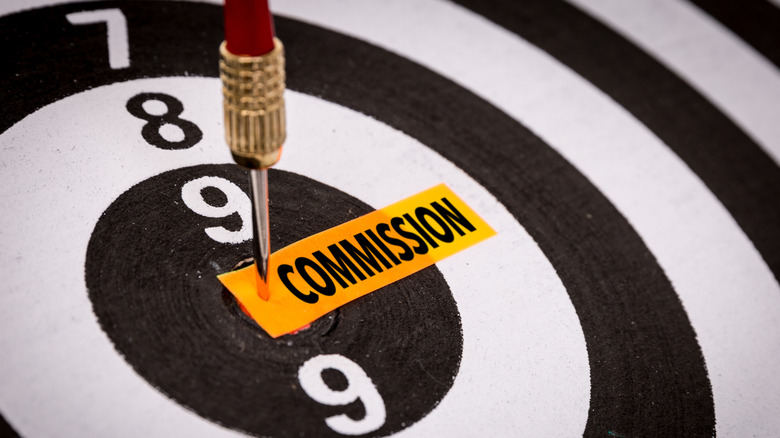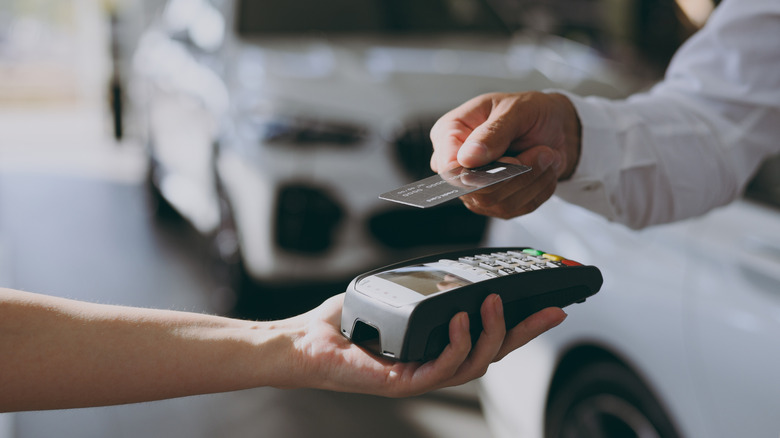How Much Do Car Salespeople And Dealerships Make? A Look At The Numbers
The world of car sales can be a confusing one, especially when it comes to the matter of money. Of course, the amount made by any given dealership will vary hugely from one to the next. For instance, a small lot with 20 to 25 specialist sports cars is going to produce a very different profit than the huge business down the road with 1,000 everyday sedans and SUVs to choose from. So, we have to look at averages.
Fortunately, someone has run the numbers for us. Haig Partners has produced a report that delves into the dollars of dealerships, and, according to their findings, the typical privately owned retail store in the U.S. is currently generating around $4.2 million in pre-tax profit. From quarter-to-quarter, and year-to-year, there is much fluctuation in profits realized, and that's likely to do with how volatile the market is right now. The market has been dealing with the aftermath of Covid for some years now, and with the more recent revision of federal tax credits and introduction of tariffs, the auto market doesn't really know if it's coming or going.
It's a similar story with salespeople. While some are earning well and drawing in six-figure salaries, others are barely able to make ends meet. Having worked in the industry myself for some years, in addition to other SlashGear writers who have also weighed in on this topic, it's easy to see why some win while others fail. Complex pay structures, moving goal posts, and different rewards for different cars all equate to much confusion.
Here's how much salespeople can make in the auto industry
How long is a piece of string? There is no hard and fast rule for how much a salesperson in the auto industry can earn, there are simply too many variables. Each dealer will have its own pay structure. Some will have a large sales team, some will only have a few, and the cars themselves matter too. It's quite typical for new cars to pay smaller commissions, perhaps just 2% or 3% of the sale price, whereas used cars regularly reward salesfolk with around 15% to 20% of the gross profit from the unit.
Then there is the frequency with which you make sales. You might have a stellar weekend, shift four or five units, and earn a few thousand in commission. Great, but if you fall flat over the next week or two, it all balances out. On the other hand, you might regularly sell a modest amount of units, a few a week perhaps, but you clean up on products and extras. Commissions are paid out on things like extended warranties, paint protection packages, and service plans. These are trickier to earn than the sale of the car itself, so they tend to pay out handsome commissions — a good salesperson could easily earn hundreds from selling a few additional products.
Scaled pay plans entice salespeople to stay hungry
It's not unusual for dealerships to pay salespeople on a weekly basis. A bad week is easy to leave behind, you can ready-up and get excited for the week ahead — the chance to turn your luck around is only days away. If you're halfway through a bad month, however, it's easy to let this affect your mood, and lose motivation. Furthermore, the pay plans scale, too. So, while some pay a percentage of the gross profit, others pay a flat rate. Your first sale within the week might only be worth $100 or so, but the fifth might be $250, and the tenth something like $1,000.
The plans are designed to keep you hunting for the next sale, to climb the ladder and earn the big bucks. This is why you'll see wide estimates for salesperson salaries, such as the $58,000 to $99,000 estimate provided by Glassdoor. Those on the lower end — around $40,000 – probably won't enjoy the job all that much, and won't stick around, while those earning close to or even over $100,000 will feel like they understand the systems and can work them to their benefit.


